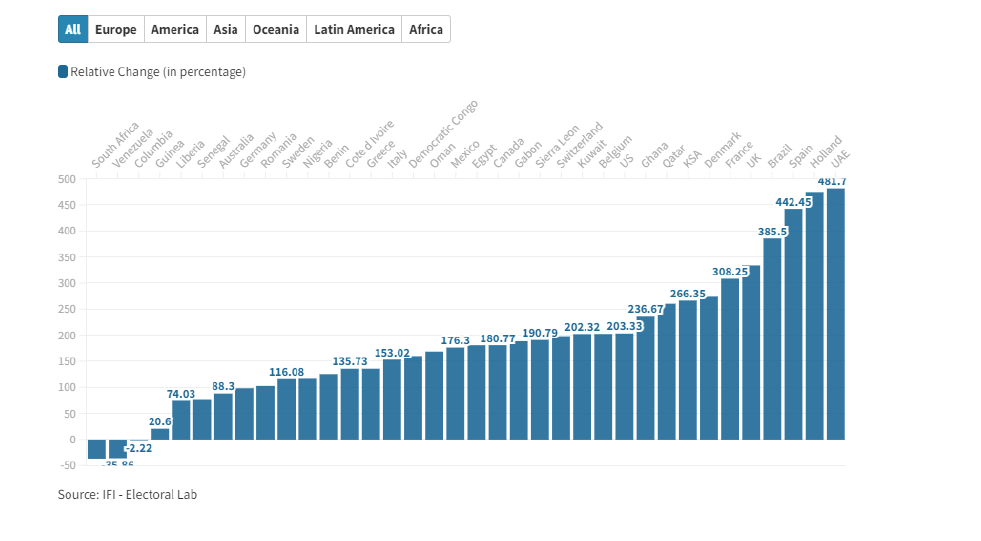Electoral Lab
Expats Turnout Analysis

Relative Change in the Numnber of Expat Voters Between 2018 and 2022
Moreover, despite early reports about a lower turnout of expatriate voting in districts with Sunni majorities like Beirut 2, Tripoli, and Saida, reality has proven otherwise. The average turnout percentage is 63.05%, with the district of Metn topping the field with 72.25%, followed by Kesserwan, Jbeil, and Batroun in the 69%. This shows that districts with Christians majorities had a much higher turnout than the average.
Meanwhile, Sunni districts were just below the average, around 62%. It is a very interesting number, close to the overall expatriate average and higher than the 2018 general average. Moreover, it was also above the overall turnout percentage of the Sunni all over Lebanon in 2018, which was 46%.

There is a significant increase in turnout compared to the expatriates and general 2018 turnout. Ranging from +1.5% in Beirut 2, to almost +10% in Tripoli and around +5% in Sidon.
Another interesting finding is the drop in turnout percentage in districts with Shiite majorities compared to the general average. For example, Tyre was at 60%, and Sidon district (sarafand) was at a very low 53.95%. Similarly, Nabatieh was at 57.49% and Baalbek at 59.52%. Although, in some countries, it is harder to vote for Amal and Hezbollah. However, it is clear that there is a drop in Shiite turnout.
Therefore, the analysis of the expatriate voting points out towards three initial findings: Christian participation is on the rise, similarly but with a smaller increase in the Sunni community, and a medium drop in the Shiite turnout. These indicators might not be fully translated in the general elections, but they are still significant and will have a measurable impact.
In another analysis of the expatriate voting by districts, the electoral Lab compared the number of voters to the 2018 threshold in an effort to find districts where the number of expatriates voting is significant enough to change the result by comparing the number of expatriates votes towards the 2018 threshold. Thus, there are four districts in which expatriates' votes are above the 2018 threshold. In these districts, the expatriate vote could very well change the overall results. They are Beirut 1&2, North 3, and Mount Lebanon 4 (Chouf, Aley).
Meanwhile, there are three additional districts, Metn, Tripoli, and South 3, where the expatriates' votes can moderately impact the results. In the rest, the votes would have a limited impact. It is important to note that the out-of-country votes will support different lists, which could dilute its impact. Nevertheless, several indicators point towards significant expatriates' support for emerging parties.
South 3 needs a special mention. It is one of the few districts where emerging parties were able to unite and field a convincing slate of candidates. A breakthrough in that district will have some very interesting consequences. Keep an eye on that district throughout the voting day.

Finally, Sunday might hold many surprises. Unfortunately, the results might be long to come. The Lab will explore this issue in more details in an upcoming article, and on Sunday, the Electoral Lab will be updating the turnout projection regularly compared to 2018, with each official update by the Ministry of Interior and Municipalities.
Opinions expressed in these articles are those of the author and do not necessarily reflect the views of the Issam Fares Institute for Public Policy and International Affairs at the American University of Beirut
About the Electoral Lab
The Electoral Lab is a new research initiative launched by the AUB Issam Fares Institute for Public Policy and International Affairs (IFI) with the support of the Friedrich Naumann Foundation (FNF) Lebanon. The lab aims to raise awareness about political discourse around elections both in content and form in Lebanon and the region. It seeks to highlight important thematic subjects that are rarely discussed during the electoral cycle and increasing public awareness of the importance of public data, especially electoral results. This initiative focuses on three main themes: conversation and dialogue with different political stakeholders, deep thematic analysis, and spreading awareness and availability of open electoral data.
